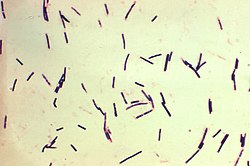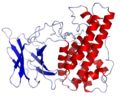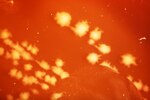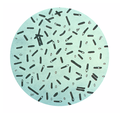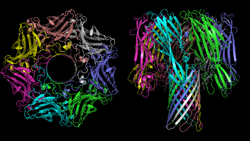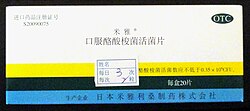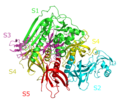adaptations in C. perfringens that persisted within close range of mucins. There are five major toxins produced by Clostridium perfringens. Alpha, beta, epsilon...
72 KB (8,054 words) - 16:20, 30 April 2025
Clostridium perfringens alpha toxin is a toxin produced by the bacterium Clostridium perfringens (C. perfringens) and is responsible for gas gangrene and...
5 KB (434 words) - 00:23, 15 December 2022
membrane-disrupting toxin that creates pores causing hemolysis and tissue damage Clostridium perfringens alpha toxin, a membrane-disrupting toxin with phospholipase...
554 bytes (84 words) - 18:09, 22 May 2024
septicum can cause gas gangrene, but unlike other Clostridium species like Clostridium perfringens, no trauma is necessary at the site of the infection...
19 KB (1,990 words) - 16:22, 30 April 2025
Clostridium perfringens beta toxin is one of the four major lethal protein toxins produced by Clostridium perfringens Type B and Type C strains. It is...
8 KB (857 words) - 11:25, 18 August 2023
Clostridium botulinum is a gram-positive, rod-shaped, anaerobic, spore-forming, motile bacterium with the ability to produce botulinum toxin, which is...
55 KB (6,003 words) - 16:09, 30 April 2025
Clostridium septicum virulence factor is a pore-forming toxin called alpha-toxin, though it is unrelated to the Clostridium perfringens alpha-toxin....
21 KB (2,345 words) - 20:58, 5 May 2025
hemorrhagic toxin (TcsH), lethal toxin (TcsL), and Clostridium novyi alpha toxin (Tcn α), thus, making this cohort to be the large family of toxin clostridial...
42 KB (4,726 words) - 06:08, 3 June 2024
favorable insertion of the pore-forming toxin. Some β-PFTs such as clostridial ε-toxin and Clostridium perfringens enterotoxin (CPE) bind to the cell membrane...
32 KB (3,752 words) - 18:59, 1 March 2025
produces gas within tissues. It can be caused by Clostridium, most commonly alpha toxin-producing C. perfringens, or various nonclostridial species. Infection...
35 KB (3,893 words) - 17:34, 4 May 2025
Botulinum toxin, or botulinum neurotoxin (commonly called botox), is a neurotoxic protein produced by the bacterium Clostridium botulinum and related...
120 KB (12,050 words) - 20:55, 8 May 2025
Boquet P, Popoff MR (December 1993). "Characterization of Clostridium perfringens iota-toxin genes and expression in Escherichia coli". Infect. Immun....
9 KB (921 words) - 17:11, 3 March 2025
activated. The genes encoding alpha-toxin (Clostridium perfringens), Bacillus cereus PLC (BC-PLC), and PLCs from Clostridium bifermentans and Listeria monocytogenes...
25 KB (2,691 words) - 16:58, 4 May 2025
Clostridioides difficile toxin A (TcdA) is a toxin produced by the bacteria Clostridioides difficile, formerly known as Clostridium difficile. It is similar...
24 KB (2,759 words) - 06:31, 18 April 2025
lethal toxin of clostridium sordellii. The alpha-toxin is characterised as lethal and necrotizing.[citation needed] The type A alpha-toxin is oedematising...
18 KB (2,002 words) - 16:19, 30 April 2025
Tetanus toxin (TeNT) is an extremely potent neurotoxin produced by the vegetative cell of Clostridium tetani in anaerobic conditions, causing tetanus...
17 KB (1,936 words) - 06:22, 12 November 2024
encoding non-toxic haemagglutinin (NTNH) and genes encoding Clostridium perfringens toxins (alpha, beta, epsilon and iota) has been demonstrated by PCR assay...
12 KB (1,318 words) - 23:40, 2 March 2025
animals. Clostridium perfringens has the ability to reproduce quickly producing toxins relating to the cause of diseases. The pore-forming toxin perfringolysin...
43 KB (5,326 words) - 18:25, 7 March 2025
Exotoxin (category Toxins)
Well-known exotoxins include: botulinum toxin produced by Clostridium botulinum; Corynebacterium diphtheriae toxin, produced during life-threatening symptoms...
17 KB (2,060 words) - 23:55, 25 March 2025
Hathewaya histolytica (redirect from Clostridium histolyticum)
histolytica closely resembles the comparable Clostridium perfringens, but without the capsule of C. perfringens. This may interfere with diagnosis of H. histolytica...
15 KB (1,879 words) - 16:24, 30 April 2025
Anthrax toxin is a three-protein exotoxin secreted by virulent strains of the bacterium, Bacillus anthracis—the causative agent of anthrax. The toxin was...
26 KB (3,581 words) - 15:30, 29 April 2025
Ricin (redirect from Ricin toxin)
polypeptide arranged into alpha-helices and beta-sheets. The three domains form a pronounced cleft that is the active site of RTA. Ricin toxin B chain (RTB) is...
61 KB (6,864 words) - 04:53, 6 May 2025
Perelle S, Boquet P, Popoff MR (1993). "Characterization of Clostridium perfringens iota-toxin genes and expression in Escherichia coli". Infect. Immun....
23 KB (2,587 words) - 20:36, 18 March 2025
Diphtheria toxin is an exotoxin secreted mainly by Corynebacterium diphtheriae but also by Corynebacterium ulcerans and Corynebacterium pseudotuberculosis...
15 KB (1,494 words) - 14:14, 22 October 2024
Clostridium enterotoxins are toxins produced by Clostridium species. Clostridial species are one of the major causes of food poisoning/gastrointestinal...
4 KB (476 words) - 13:54, 11 July 2023
Lecithinase C (redirect from Clostridium welchii alpha-toxin)
Sugahara T, Ohsaka A (May 1974). "Purification of Clostridium perfringens phospholipase C (alpha-toxin) by affinity chromatography on agarose-linked egg-yolk...
2 KB (212 words) - 14:44, 26 August 2023
Α-Bungarotoxin (redirect from Alphabungarotoxin toxin)
specific amino acid substitutions at 187, 189, and 194, alpha-subunits, which makes the binding of the toxin non-existent. In humans, exposure to α-bungarotoxin...
41 KB (5,102 words) - 21:24, 24 February 2025
Enterotoxin (category Toxins by organ system affected)
database. Clostridioides difficile Clostridium perfringens (Clostridium enterotoxin) Vibrio cholerae (Cholera toxin) Staphylococcus aureus (Staphylococcal...
11 KB (1,151 words) - 04:13, 2 November 2024
A toxin is a naturally occurring poison produced by metabolic activities of living cells or organisms. They occur especially as proteins, often conjugated...
25 KB (2,613 words) - 12:11, 23 January 2025
produced by Clostridium perfringens, Staphylococcus aureus, Pseudomonas aeruginosa or Listeria monocytogenes. C. perfringens alpha toxin (lecithinase)...
1 KB (130 words) - 01:13, 28 June 2023

